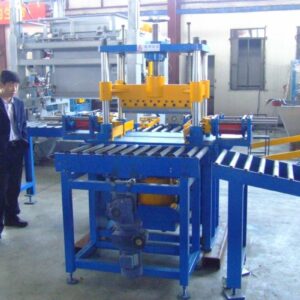Quality control measures are crucial in the cement block industry to ensure that the blocks produced are of high quality and meet industry standards.
Here are some of the most common quality control measures used in the cement block industry:
Raw material testing: Raw materials such as cement, sand, and gravel should be tested regularly to ensure that they meet the required quality standards. Tests may include particle size analysis, chemical analysis, and moisture content analysis.
Mix design testing: Mix design testing involves testing the cement, sand, and gravel mix to ensure that it meets the desired strength and durability requirements. This testing can involve compressive strength testing, water absorption testing, and curing testing.
Block testing: Finished blocks should be tested to ensure that they meet industry standards for strength, durability, and dimensional accuracy. Tests may include compressive strength testing, water absorption testing, and freeze-thaw testing.
Quality control during production: Quality control measures should be implemented during production to ensure that the blocks are being produced to the desired standards. This can include monitoring the mix design, checking the quality of the raw materials, and ensuring that the machine is properly calibrated and maintained.
Inspection and sorting: Blocks should be inspected and sorted before they are shipped to customers to ensure that they meet the desired quality standards. China concrete block maker supplier Blocks that do not meet the standards should be rejected or sorted separately.
Record keeping: Records should be kept of the testing results and quality control measures implemented. This can help identify areas for improvement and ensure that quality standards are being met consistently.
By implementing these quality control measures, cement block manufacturers can ensure that their blocks meet the desired quality standards, which can help build trust and credibility with customers and ensure the long-term success of the business.
How can cement block manufacturers ensure that their machines are properly calibrated?
Proper calibration of cement block making machines is crucial for producing high-quality blocks that meet industry standards.
Here are some steps that cement block manufacturers can take to ensure that their machines are properly calibrated:
Follow manufacturer guidelines: Follow the manufacturer’s guidelines for calibrating the machine. The manufacturer should provide detailed instructions on how to calibrate the machine, including the tools and equipment required.
Regular maintenance: Regular maintenance of the machine is crucial for ensuring that it is functioning properly and producing high-quality blocks. Maintenance should include cleaning, lubrication, and inspection of all parts, as well as replacement of worn or damaged parts.
Check the alignment: The machine should be checked for proper alignment to ensure that it is producing blocks that meet the desired dimensional accuracy. Check the alignment of the moulds, the filling hopper, and the hydraulic system.
Check the hydraulic system: The hydraulic system should be checked for proper pressure and flow rate. The pressure should be set to the manufacturer’s recommendations, and the flow rate should be adjusted to ensure that the moulds are being filled evenly.
Test the blocks: Test the blocks produced by the machine to ensure that they meet the desired quality standards. Test for factors such as strength, durability, and dimensional accuracy.
Record keeping: Keep detailed records of the calibration process, including the results of any tests performed and any adjustments made to the machine.
